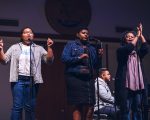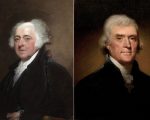Evangelical Christian Colleges Take Steps to Address Racial Justice after Criticism
Dozens of evangelical colleges and universities issued statements grieving George Floyd’s death in police custody and pledging to find practical steps to address racial justice on and beyond their campuses. But the efforts left some students unsatisfied.
Church Conflict During COVID-19 Growing Worry for Pastors
Church conflict is a growing pressure point for pastors during the coronavirus pandemic, a new report shows. Twenty-seven percent of evangelical and mainline pastors cited maintaining unity and addressing conflict and complaints when asked about the pressure points they are feeling most.
John Lewis & the Masks Black Preachers Wear
John Lewis said in his posthumously penned op-ed: “Each of us has a moral obligation to stand up, speak up, and speak out.” This is why Black preaching and Black preachers matter.
Trump’s 2020 Religious Attack on Biden Harks Back to 1800
Last week President Donald Trump attacked his presumptive Democratic opponent, Joe Biden, on religious grounds. It’s been 220 years since the religion card was played so bigly in an American presidential campaign. The precedent is more apt than you might think.
How the Black Plague Made the Shroud of Turin a Beloved Relic
Just as the faithful clung to religious iconography — whether true relic or icon — during pestilent periods in the Middle Ages, relics remain relevant to the hopeful in the modern era.
To Cope with Pandemic, Americans Choose Binge-Watching TV Over the Bible
When it comes to coping with the stress and uncertainty of a pandemic, most Americans are turning not to God, but to TV. That’s just one of the findings of a Pew Research Center survey released Friday (Aug. 7).
Religious Freedom in America: Popular & Polarizing
The principle of religious freedom is important to most Americans. But as President Donald Trump touts his support for it during his reelection bid, there are notable fault lines among people of different faiths and political ideologies over what it truly means.
NY Church to Devote $200,000 to ‘Reparations’ with Housing Help, Anti-Racism Training
A historic New York City church has decided to devote $200,000 — about a tenth of its budget — to provide housing assistance and youth anti-racism training.
Churches See Success with Online Giving
As churches adjusted to not meeting in person during coronavirus, online giving has increased. And some pastors see this not only helping right now but also as a positive shift for future giving and ministry as more people give online regularly.
Faith in Protest as Young People Find Fervor on the Street
Americans, particularly young adults, are becoming less religious in the formal, traditional sense. Still, surveys find younger Americans are just as spiritual as their older counterparts, and many have found other expressions of faith outside formal religion.










